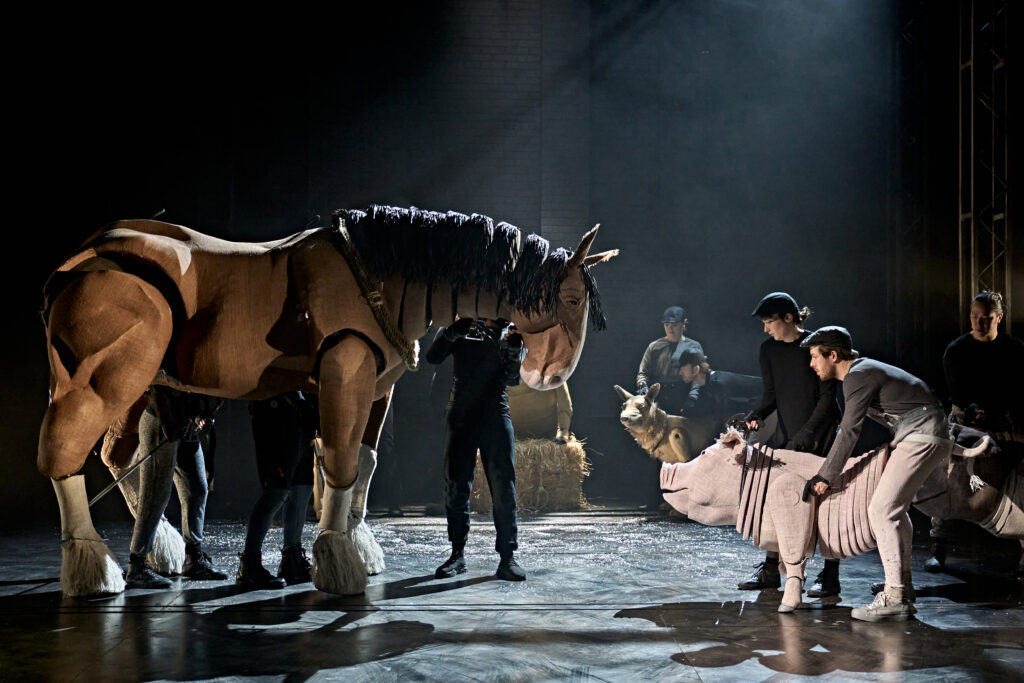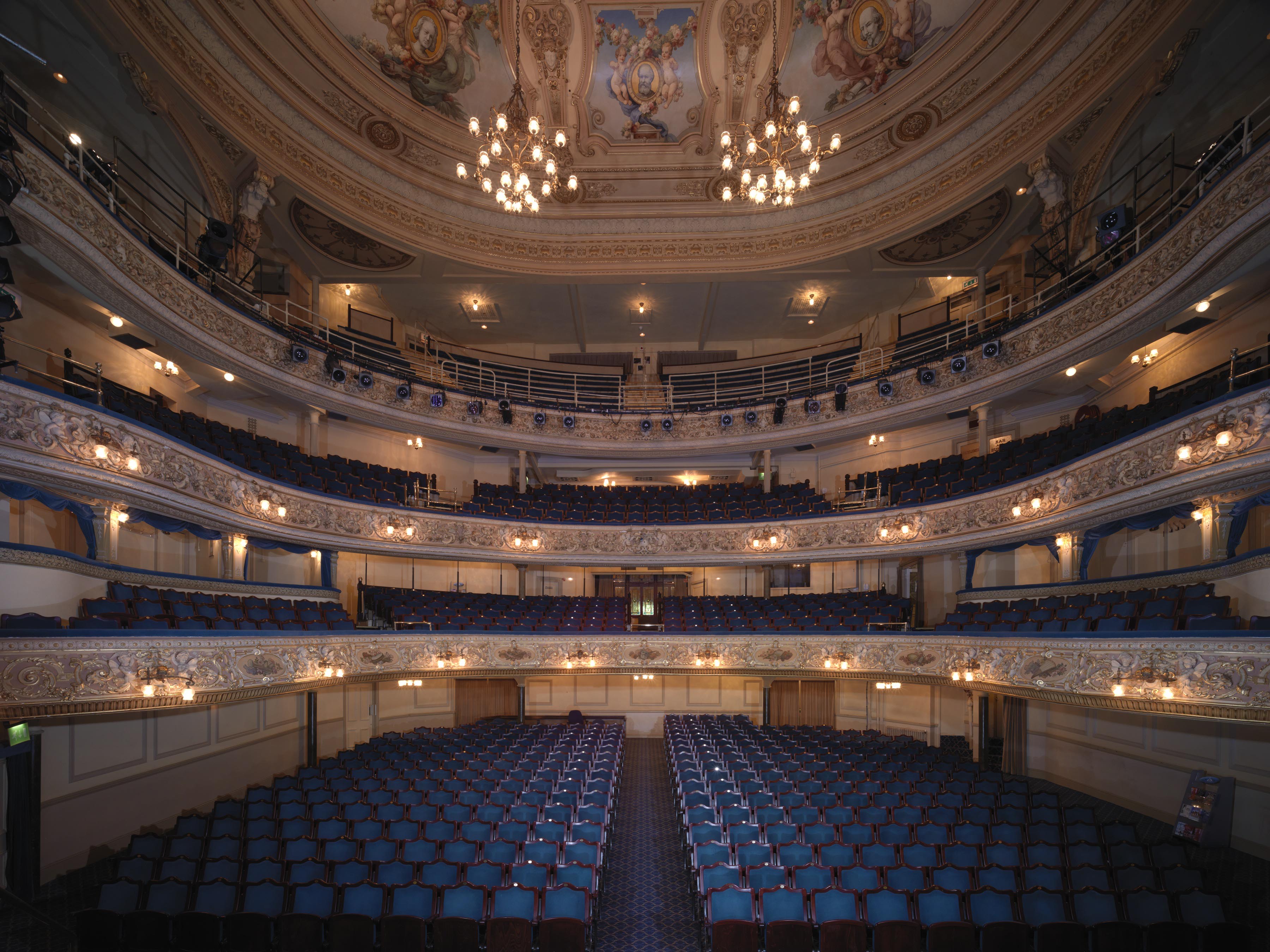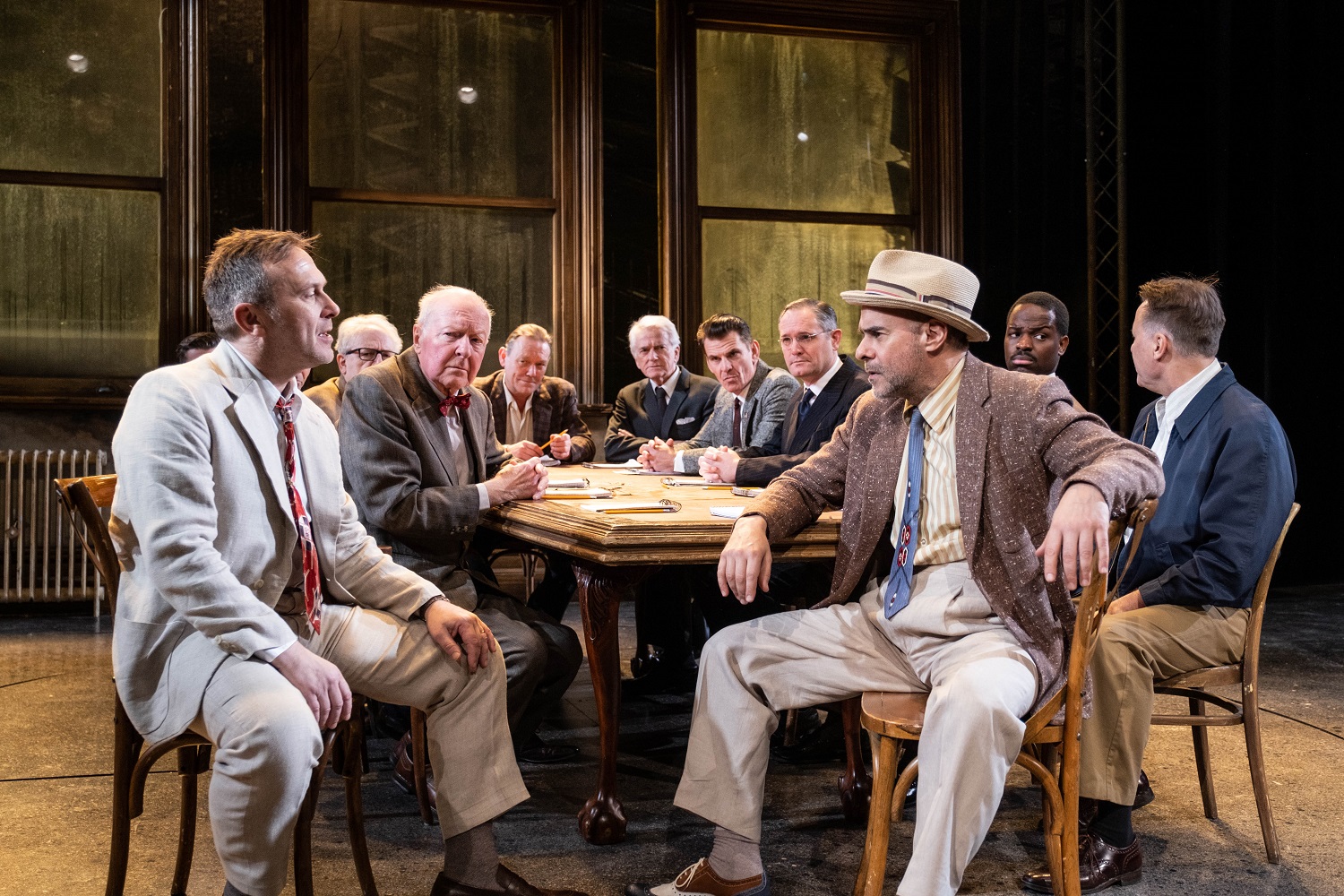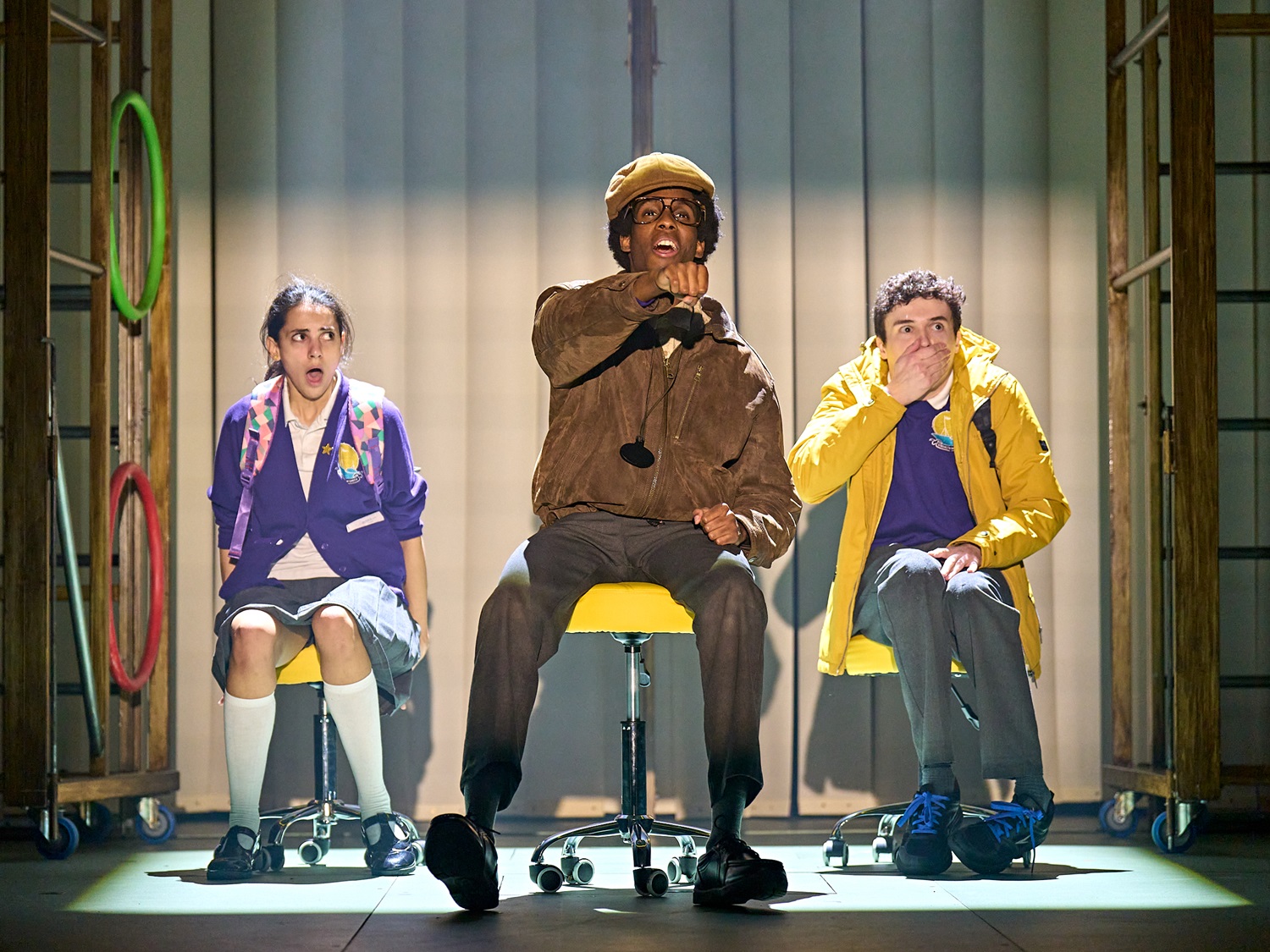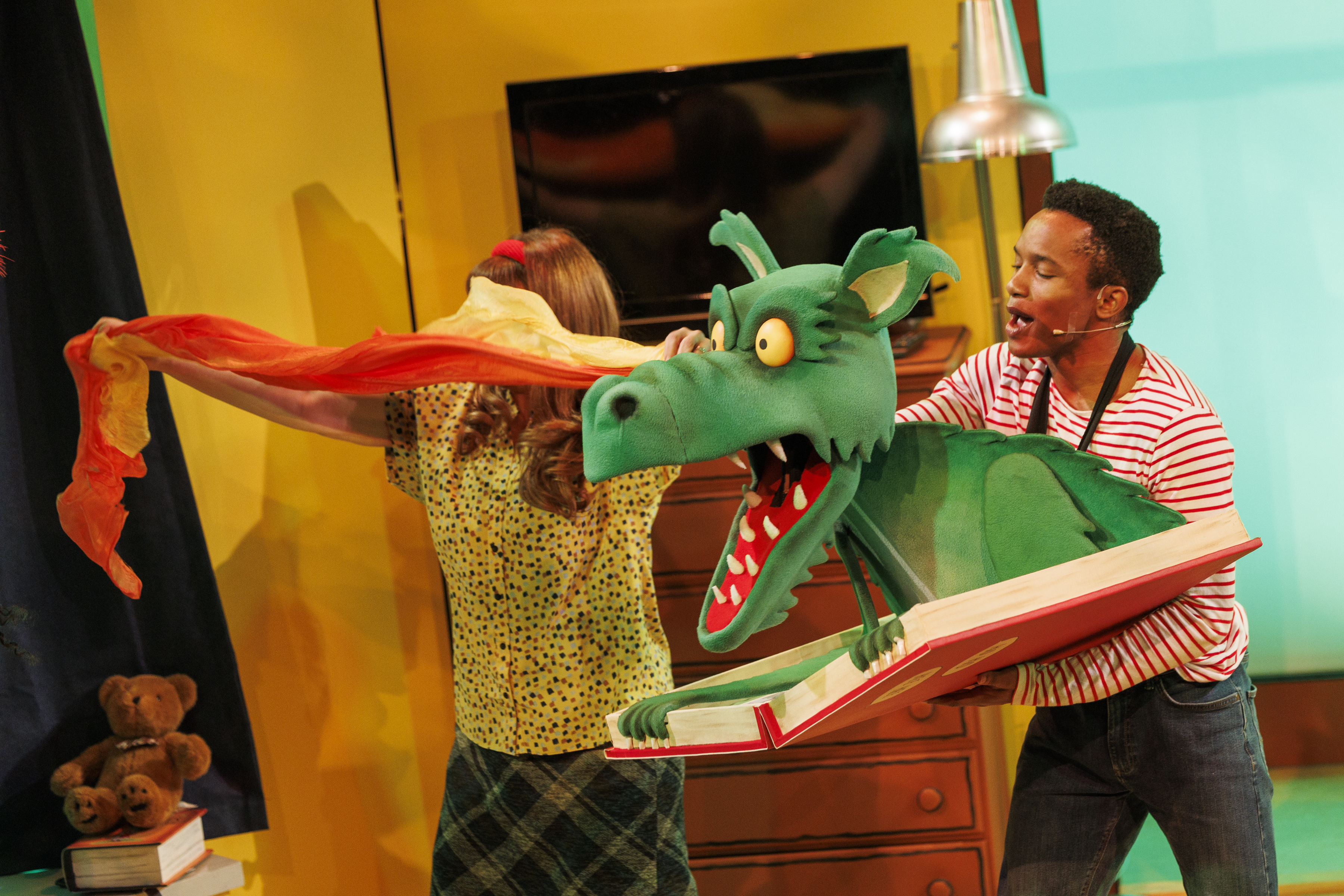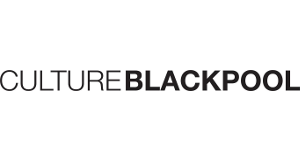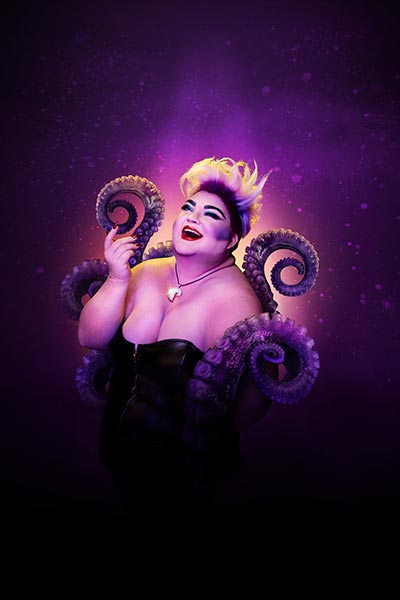
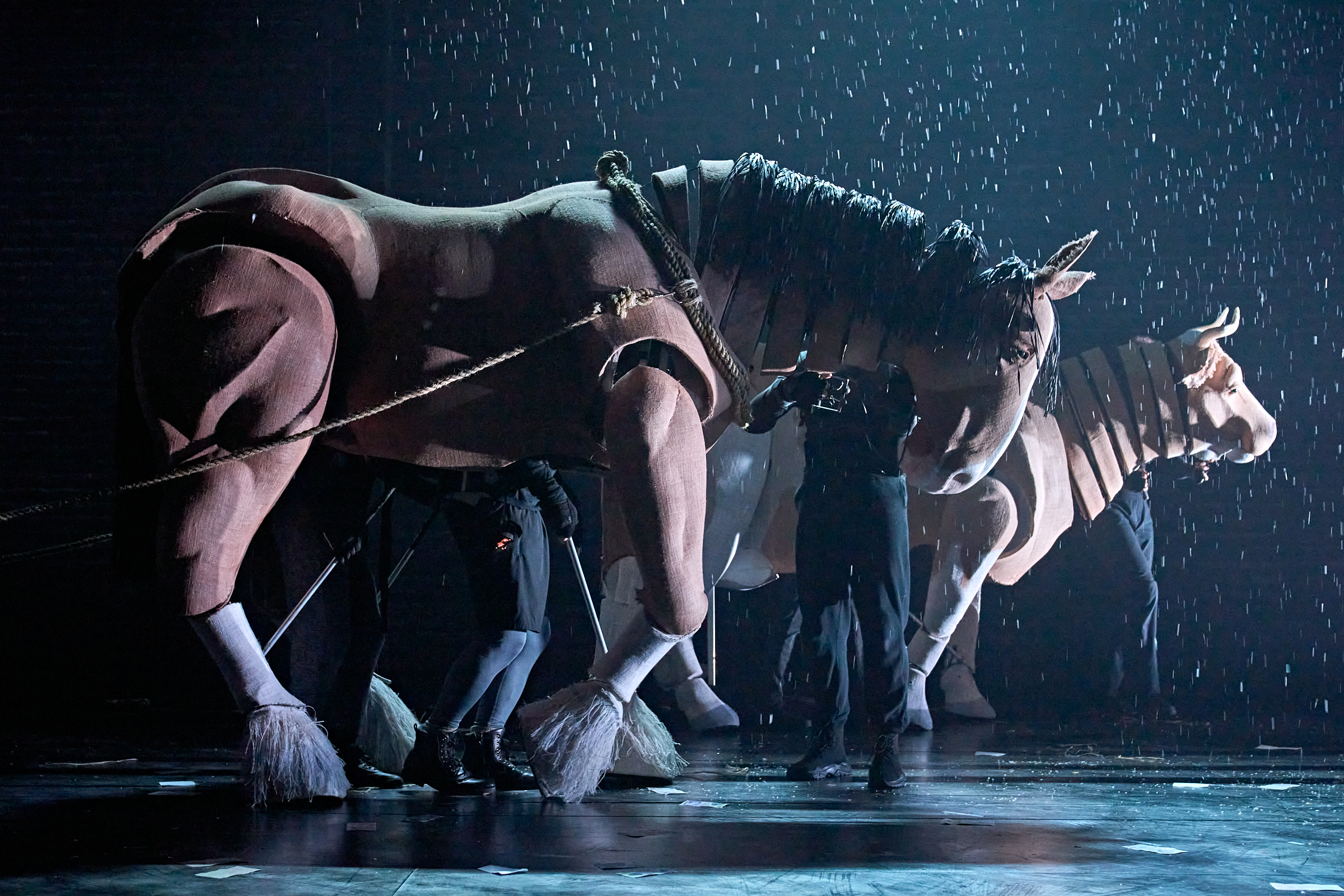
The Life of Writer George Orwell
14 min read
Share
Writer George Orwell – Blackpool Grand is excited for a new production of George Orwell’s Animal Farm to come to the theatre in April this year. A Children’s Theatre Partnership in association with Birmingham Rep, this exciting new adaptation of one of Orwell’s most celebrated works is something we can’t wait to arrive in our town and in preparation for its five-day run at the Grand, we’re taking a closer look at the life and time of George Orwell.
Orwell: The Early Years
George Orwell is the pen name of Eric Arthur Blair. He was born in 1904 in Motihari in the Bengal region of India during the time of British colonial rule. His parents were British, and as a child, his parents brought him back to England. His love for writing and sharing his opinions began in his early life.
The family were not rich by any estimation, and his personal essays in later life are a testament to a less-than-perfect childhood, with his formative years not as rewarding as he might have hoped. However, his gift for writing was evident from his childhood with his first published work, the poem, Awake Young Men of England, printed in the local Henley and South Oxfordshire Standard when he was just eleven years old.
Orwell went on to attend the prestigious Eton College. At the time, literature was not accepted as a subject for boys, so Orwell spent his time studying and learning from the master writers and developing his unique writing style. The socialist and liberal ideals that became a priority in his later life were also first introduced to Orwell at Eton. His diaries and writings show his time at Eton was particularly happy with tutoring from many eminent scholars, including Aldous Huxley, often considered a writer in a similar style as Orwell.
25 Facts about George Orwell
Adult Years
In 1922, aged just nineteen, Orwell moved to Burma. He worked as an Assistant Superintendent in the Burma Police Force before his dislike and distaste for British Imperialism became too much. In 1928 he moved again, this time to Paris. His time in Paris involved taking on a range of low-paying jobs, and this pattern followed when he returned to England, moving to London in 1929 and continuing in the habit of low paid work. His experiences during this time provided the inspiration for his first novel, Down and Out in Paris and London. It was at this point he also took on the pen name George Orwell. The novel explored his experiences of poverty and surviving below the breadline. He felt a pen name was a better option than using his real name, as he didn’t want to embarrass his family. He chose the name George Orwell as it represented his lifelong appreciation and love for quintessentially English landscapes and traditions. George, is of course the patron saint of England while the river Orwell is a popular sailing location that he often loved to visit.
Orwell also spent some time teaching, mainly at a small private school in Middlesex. He was plagued by ill health, and it was around this time, in the early 1930s, he first contracted pneumonia through tuberculosis. Pneumonia continued to haunt Orwell throughout his life with several hospitalisations due to the condition in 1938, 1947 and 1950.
Orwell’s commitment to his writing was evident as he took time out of his teaching career to dedicate to his literary pursuits. In 1933 he quit teaching altogether and spent a year in the seaside town of Southwold working on this next novel, Burmese Days. When not writing, he worked part-time in a bookshop and met his first wife Eileen O’Shaughnessy. In 1936, he and Eileen were married and then his next big adventure began, with a move to Spain to write about the Spanish Civil War as a journalist.
Spain became a haven for Orwell. He found what he had always looked for in a home, a truly socialist state. He campaigned and was part of the struggle against Franco’s Fascist party. His time in Spain was short-lived and by 1939 he had returned to England, before the beginning of the Second World War.
The Second World War changed the direction of many people’s careers. Orwell’s wife, Eileen, began working at the Censorship Department of the Ministry of Information. Orwell put his name down on the Central Register for work, but nothing came of this. He couldn’t fight due to his ill health and damaged lungs and spent some of the early years of the war focused on essay writing. He kept a fascinating wartime diary and found out, for absolute certainty, that he could not fight in the war in June 1940. He was involved in the Home Guard and wanted to promote its potential as a socialist body and revolutionary people’s militia. He didn’t achieve his goal of official “war work” until August 1941, when he began working with the British Broadcasting Corporation (BBC).
Writer Orwell and the BBC
In 1941, Orwell began working with the BBC. His role was to oversee and be in charge of broadcasting to India and Southeast Asia. Orwell openly disliked this job and everything about it went against his political stance, morals, and nature. The job involved spreading British propaganda in the colonised states, which was in direct opposition to Orwell’s political stance and natural opinions. He supervised culture broadcasts across the BBC’s Eastern Service to oppose propaganda in the region from Nazi Germany. He also had the opportunity to work with a wide range of recognisable cultural and literary figures as he developed a cultural programme for the service, working with notable names including T.S. Eliot, Dylan Thomas, Ahmed Ali and William Empson. His strong views and dislike for the formality of an office environment led him to resign from the BBC in September 1943. At this time, Orwell had moved onto a new and much more fitting job as literary editor at The Tribune. He also took on a vital Second World War role as he became war correspondent for the Observer, working both in Paris and Cologne.
Family and Death
In 1944, Orwell and his wife Eileen adopted their son Richard. Richard described Orwell as a wonderful father who provided him with devoted (if rugged) attention. Sadly, Eileen died suddenly the same year of the adoption, just before Orwell’s highly acclaimed and pivotal novel, Animal Farm, was published. His poor health continued to impact much of his ability to work, but his commitment to his literary works never wavered. 1984, another huge hit, was published in 1949 and was probably his most successful novel.
In 1949, Orwell married his second wife, Sonia Brownwell. His health had sadly been in decline since another bout of tuberculosis in 1947. On 21st January 1950, an artery burst in Orwell’s lung, and he died, aged just 46. His son Richard was brought up by his sister Avril and today is the patron of the Orwell Society.
The Orwell Society is a membership organisation focused on promoting understanding and appreciation of Orwell’s life and works. The society is a registered charity and focuses on keeping Orwell in the public mind and utilising his works as an educational tool for future generations.
Literary Works and Style
Despite his reputation as a novelist being what most people know him for, Orwell never considered himself in this light. His writing career spanned over seventeen years and a lot of it was journalism and personal essays. His most revered works are considered some of the 20th centuries finest writing. His written works as a whole are a testament of the quality of English literature and biographical works of all time, let alone amongst his peers.
Orwell’s writing style is recognised as unique and unlike anything seen before it. Simple but not simple-minded or dumbed-down, Orwell’s style is extremely direct and often has a journalistic feel. Allusions or metaphors are not in style and his writing is never overly flowery or packed with unnecessary description for the sake of it. In his own words “Good prose should be transparent, like a window pane”. Orwell was a great truth seeker and even his fictional works were grounded in truth and demonstrative of the political world he was living in. He was particularly focused on showing the lives and struggles of “real” people, not imaginary characters and tried to create works that demonstrated how people’s real lives are lived and survived. A clearest description of Orwell’s view of language and writing is taken from his essay ‘Politics and the English Language’: “To write or even speak English is not a science but an art. There are no reliable words. Whoever writes English is involved in a struggle that never lets up even for a sentence. He is struggling against vagueness, against obscurity, against the lure of the decorative adjective, against the encroachment of Latin and Greek, and, above all, against the worn-out phrases and dead metaphors with which the language is cluttered up.”
Orwell in Modern Culture
Orwell’s themes and stories have been the inspiration for many further works and inspired many recognisable artists and concepts including:
Big Brother
The sensationalist CBS TV show Big Brother took the world by storm for decades and is still running in some countries to this day. First created in the Netherlands in 1999, the show draws its whole focus from Orwell’s 1984, including its name. Featuring around 20 contestants living together and being watched 24 hours a day. Big Brother features clear and obvious references to Orwell’s novel. The original Big Brother is of course the omnipresent governmental force in 1984 and the TV company cleverly took this concept and put people in the situation Orwell had created for Oceania. The surveillance systems in the TV show are also a mirror image of the telescreens in Orwell’s work. The evictions the show became famous for, as each housemate is voted out of the Big Brother House, are also reminiscent of the vaporisations and disappearances in Orwell’s Oceania.
The show initially featured stripped-down living facilities mirroring Orwell’s novel. This environment is designed to encourage the contestants to socialise, form relationships and ultimately, create great television full of heartbreak, disagreement, and entertainment. The TV show was usually less violent than Orwell’s Oceania, but not always!
David Bowie’s Music
While David Bowie was recognised for his visionary and original style, he still had to get his inspiration from somewhere. His album, Diamond Dogs, featured many songs specifically referencing Orwell’s 1984, including We Are Dead, Big Brother and a song titled 1984 itself. The clear and direct references show this novel’s influence on Bowie.
Some Games are More Equal Than Others
Animal Farm’s most famous statement “some animals are more equal than others”, has been taken and turned on its head by computer games and RPG specialists, Indie Press Revolution, utilising it for their main slogan: Some games are more equal than others.
Pink Floyd’s Animals
The 1977 album Animals by Pink Floyd took some of its inspiration from Animal Farm. Throughout the album people are split into separate animal categories and the songs are deeply connected and linked with Animal Farm. The political angles are slightly different however, as Animal Farm drills into the excesses of communism while Animals is focused on capitalism.
The Orwell Statue
On November 7th, 2017, a statue of George Orwell was unveiled outside Broadcasting House, BBC Headquarters in London. It seems a strange commemoration in some ways, as Orwell was known to have been unhappy at his time with the organisation. Despite this, his commitment to the truth and exceptional standards in journalism make him a great figurehead for the corporation and someone any journalist can take inspiration from. The statue has been owned by the Orwell Society since 2021 and the sculptor, Martin Jennings, won the Public Monuments and Sculpture Association’s Marsh Award for Excellence in Public Sculpture for it in 2018.
Orwell’s time at the BBC had a strong influence on both 1984 and Animal Farm and his status is a reminder to employees of and visitors to Broadcasting House of his standing as a Great British writer and journalist. The Orwell statue towers above passers-by and is inscribed with words from an unused Animal Farm preface “If liberty means anything at all, it means the right to tell people what they do not want to hear”.
Spotlight on Animal Farm
Animal Farm is considered one of the Orwell’s finest works and is studied in-depth at all levels of education. The novel is an anti-utopian satire which looks at the world, particularly communism, through the allegory of a farmyard. An entirely unique concept and one which captures readers instantly, it is understandably considered one of the greatest English novels of all time.
Published in 1945, Animal Farm is a political fable, almost a fairy tale drawing on events in the Russian Bolshevik Revolution and the betrayal of Joseph Stalin. Using farm animals as the protagonists, the novel sees the animals overthrowing the exploitative farmer and his workers and setting up their own egalitarian society, with no masters. While equal society seems initially successful, soon the intelligent and power-hungry leaders, the pigs, soon take over the revolution is less about the animals and more about the pigs claiming ultimate power. The animal’s seventh commandment initially read “all animals are equal” but the pigs mad grasp for power soon saw it amended to “all animals are equal, but some animals are more equal than others.” While we don’t want to give away the whole plot, the hopes for an equal life for all farm animals soon descended into something much worse than their previous setup.
Animal Farm covered contentious issues at a time when political stability was at a precarious stage, at the end of the Second World War. Publishers were wary of publishing a novel that so openly criticised activities with the Soviet Union. There were worries it may upset the finely balanced alliance between Great Britain, the USA, and the Soviet Union. Four publishers in total turned down the novel. Eventually Jonathan Cape accepted but then changed their mind after discussing it with the Ministry of Information. Even more interestingly, the “important official” who warned Jonathan Cape off the novel was later found out to be a Soviet agent, with a clear agenda for minimising the spread of anti-Soviet messaging.
The road to publication for Animal Farm must have been frustrating for Orwell but not unexpected. It also makes a great story of its own when new readers research its past. In 1945 the first edition was published by Secker and Warburg. The Folio Society later published an illustrated edition featuring the artwork of Quentin Blake in 1984. Furthermore a Secker and Warburg edition, with bold illustrations by cartoonist Ralph Steadman, was published in 1995 to celebrate the 50th anniversary of the first edition. After struggles to initially find a publisher, Animal Farm has since been translated into at least 70 different languages and interestingly, Russian and other Slavic languages were amongst the first.
Animal Farm Adaptations and Productions
The novel has been adapted for a wide range of different media. A solo stage version of the novel was adapted and performed by Guy Masterson in 1995 and has been performed around the world. It has also been adapted and toured by the National Youth Theatre and theatrical version was staged by the National Theatre in London in 1984, featuring music by Richard Peaslee and lyrics by Adrian Mitchell. Of course, there is also the new adaptation written and directed by Robert Icke which is coming to the Grand in April.
Animal Farm has also been adapted for film and television. The 1954 animated adaptation sees the story adapted significantly to suit the ethos of its secret backer, the CIA’s Psychological Warfare department. Excitingly, Lord of the Rings actor Andy Serkis is adapting a live-action version of the story for Netflix release in the near future, another show to look forward to. The show has also been adapted for radio several times, most recently with Tamsin Greig narrating and Nicky Henson as Napoleon.
Many of the earlier adaptations of Animal Farm have had an ulterior motive. The strong anti-Soviet messaging made it easy for the story to be utilised in a propagandist way. This is most notable in the already mentioned 1954 cartoon film and in a 1950s comic strip. Notable cartoonist Norman Pett and his writer Don Freeman were secretly hired by the Information Research Department, a hidden wing within the British Foreign Office. Their task was to turn Animal Farm into a comic strip, and it was then published in newspapers in Brazil and Burma, but not in the UK.
The political power of this story has made it a powerful teaching tool for many different subjects. We’re excited to be putting on the newest adaptation of Animal Farm this April and hope many people will come along, join the show and perhaps learn something new.
Animal Farm at Blackpool Grand
Animal Farm is arriving at Blackpool Grand on 19th April and running until 25th. The show is a brand-new adaptation written and directed by Robert Icke. Icke is best known for the Olivier Award-winning Oresteia and many additional critically acclaimed works. The set design is by four-time Olivier award-winning designer Bunny Christie. The Curious Incident of the Dog in the Night-Time and Baby Doll are amongst her best-known creations. Finally, the show features the unmistakable puppetry of Toby Olié who is renowned for his work on War Horse, Goodnight Mister Tom and Running Wild.
The show is a perfect choice for Orwell fans, theatre fans and as an educational performance for secondary school classes and above. The show is recommended for children aged 11+ and the Children’s Theatre Partnership has put together their trademark bold and imaginative theatre for this retelling of Orwell’s popular novel. The show is touring around the UK for the first time this year and we can’t wait for it to arrive in Blackpool.
Book your tickets and find out more here.


